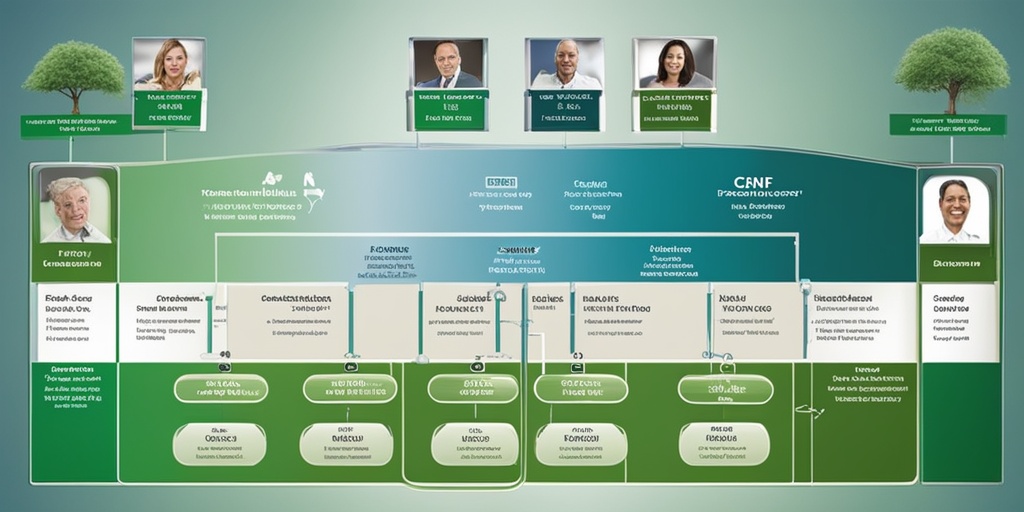“`html
What Is Mucopolysaccharidosis Type II?
Mucopolysaccharidosis Type II (MPS II), commonly known as Hunter syndrome, is a rare genetic disorder that affects the body’s ability to break down certain complex carbohydrates called glycosaminoglycans (GAGs). This condition is caused by a deficiency of the enzyme iduronate-2-sulfatase, which is crucial for the degradation of GAGs. When this enzyme is lacking, GAGs accumulate in various tissues and organs, leading to a range of health issues.
Genetic Background
MPS II is inherited in an X-linked recessive manner, meaning that the gene responsible for the disorder is located on the X chromosome. This primarily affects males, while females can be carriers and may exhibit milder symptoms. The prevalence of MPS II is estimated to be around 1 in 100,000 live births, making it a rare condition.
Types of MPS II
There are two main forms of MPS II:
- Severe form: Symptoms typically appear in early childhood, leading to significant developmental delays and physical disabilities.
- Moderate form: Symptoms may be milder and can develop later in life, allowing for a longer period of normal development before issues arise.
MPS II Symptoms
The symptoms of Mucopolysaccharidosis Type II can vary widely among individuals, but they generally become noticeable between the ages of 2 and 4. Early diagnosis is crucial for managing the condition effectively. Here are some common symptoms associated with MPS II:
Physical Symptoms
- Coarse facial features: Individuals may develop a distinct facial appearance, including a broad nose, thick lips, and a prominent forehead.
- Short stature: Growth may be significantly affected, leading to shorter height compared to peers.
- Joint stiffness: Many individuals experience limited mobility due to joint problems, which can lead to pain and discomfort.
- Hearing loss: Accumulation of GAGs can affect the ears, leading to hearing impairment.
Neurological Symptoms
In addition to physical symptoms, MPS II can also impact neurological function:
- Developmental delays: Children may experience delays in reaching developmental milestones, such as walking and talking.
- Cognitive impairment: Some individuals may face challenges with learning and memory, affecting their overall cognitive abilities.
- Behavioral issues: Changes in behavior, including aggression or anxiety, can also occur.
Other Health Complications
Individuals with MPS II may face a range of other health complications, including:
- Cardiac issues: Heart problems can develop due to GAG accumulation in the heart tissues.
- Respiratory problems: Airway obstruction and respiratory infections are common due to anatomical changes.
- Hernias: Abdominal hernias may occur due to weakened tissues.
Importance of Early Diagnosis
Recognizing the symptoms of MPS II early on is vital for effective management and treatment. If you suspect that your child may have this condition, it is essential to consult a healthcare professional for a thorough evaluation. Genetic testing can confirm the diagnosis and help guide treatment options.
For more information on MPS II and other health-related topics, consider visiting Yesil Health AI, a valuable resource for evidence-based health answers. 🌟
In conclusion, Mucopolysaccharidosis Type II is a complex condition that requires a multidisciplinary approach for management. Understanding the symptoms and seeking early intervention can significantly improve the quality of life for those affected. If you have any concerns or questions about MPS II, don’t hesitate to reach out to a healthcare provider. Your health matters! 💙
“`

“`html
MPS II Causes
Mucopolysaccharidosis Type II (MPS II), also known as Hunter syndrome, is a rare genetic disorder caused by a deficiency of the enzyme iduronate-2-sulfatase (I2S). This enzyme is crucial for breaking down specific types of complex carbohydrates called glycosaminoglycans (GAGs). When I2S is deficient or absent, GAGs accumulate in various tissues and organs, leading to a range of health issues.
Genetic Mutation
The primary cause of MPS II is a mutation in the IDS gene, which is located on the X chromosome. This gene provides instructions for producing the I2S enzyme. Since MPS II is an X-linked recessive disorder, it predominantly affects males. Females can be carriers of the mutation but typically do not exhibit symptoms due to the presence of a second, normal copy of the gene.
Enzyme Deficiency and GAG Accumulation
Without sufficient levels of the I2S enzyme, the body cannot effectively break down GAGs such as dermatan sulfate and heparan sulfate. As these substances accumulate, they disrupt normal cellular function and lead to the characteristic symptoms of MPS II, which can include:
- Joint stiffness and pain
- Enlarged organs (hepatosplenomegaly)
- Respiratory issues
- Cardiovascular problems
- Developmental delays
The severity of symptoms can vary widely among individuals, even within the same family, depending on the specific mutation and the amount of enzyme activity present.
MPS II Risk Factors
Understanding the risk factors associated with Mucopolysaccharidosis Type II is essential for early diagnosis and management. While the primary risk factor is genetic, several other factors can influence the likelihood of developing this condition.
Genetic Factors
The most significant risk factor for MPS II is being male, as the disorder is X-linked. Males inherit one X chromosome from their mother and one Y chromosome from their father. If the X chromosome carries the mutated IDS gene, the male will develop MPS II. In contrast, females have two X chromosomes, which means they can be carriers without showing symptoms.
Family History
A family history of MPS II increases the risk of having a child with the disorder. If a mother is a carrier of the mutated gene, there is a 50% chance that her sons will be affected and a 50% chance that her daughters will be carriers. Genetic counseling can provide valuable information for families with a history of MPS II.
Ethnicity and Population Factors
While MPS II can occur in any ethnic group, certain populations may have a higher prevalence of the disorder. Research indicates that MPS II is more commonly diagnosed in specific ethnic groups, which may be due to genetic factors or variations in mutation rates. Awareness of these patterns can aid in early detection and intervention.
Environmental Factors
Currently, there is limited evidence to suggest that environmental factors contribute to the risk of developing MPS II. The disorder is primarily genetic, and while environmental influences can affect overall health, they do not appear to play a significant role in the onset of this specific condition.
In summary, Mucopolysaccharidosis Type II is primarily caused by a genetic mutation leading to enzyme deficiency. The risk factors include being male, having a family history of the disorder, and certain ethnic backgrounds. Understanding these causes and risk factors is crucial for early diagnosis and effective management of MPS II. 🧬
“`

“`html
MPS II Diagnosis
Mucopolysaccharidosis Type II (MPS II), also known as Hunter syndrome, is a rare genetic disorder that affects the body’s ability to break down certain types of sugar molecules called glycosaminoglycans (GAGs). Early diagnosis is crucial for managing the condition effectively. Here, we will explore the diagnostic process for MPS II, including the symptoms to watch for and the tests involved.
Recognizing Symptoms
The symptoms of MPS II can vary widely among individuals, but they often begin to appear in early childhood. Some common signs include:
- Developmental Delays: Children may experience delays in speech and motor skills.
- Facial Features: Distinctive facial features such as a broad nose, thick lips, and a prominent forehead.
- Joint Stiffness: Limited mobility and stiffness in the joints.
- Hearing Loss: Frequent ear infections and hearing difficulties.
- Cardiac Issues: Potential heart problems that may develop over time.
If you notice these symptoms in your child, it is essential to consult a healthcare professional for further evaluation.
Diagnostic Tests
To confirm a diagnosis of MPS II, healthcare providers typically recommend a combination of clinical evaluation and laboratory tests. The following tests are commonly used:
- Enzyme Activity Test: This blood test measures the activity of the enzyme iduronate-2-sulfatase (I2S), which is deficient in individuals with MPS II.
- Genetic Testing: A sample of blood or saliva can be analyzed to identify mutations in the IDS gene responsible for MPS II.
- Imaging Studies: X-rays, MRIs, or ultrasounds may be used to assess skeletal abnormalities and organ enlargement.
Early diagnosis through these tests can significantly impact the management of MPS II, allowing for timely interventions and support.
MPS II Treatment Options
While there is currently no cure for Mucopolysaccharidosis Type II, various treatment options can help manage symptoms and improve the quality of life for affected individuals. The choice of treatment often depends on the severity of the condition and the specific symptoms present.
Enzyme Replacement Therapy (ERT)
One of the most promising treatments for MPS II is Enzyme Replacement Therapy (ERT). This therapy involves regular infusions of a synthetic version of the enzyme iduronate-2-sulfatase, which helps to break down GAGs in the body. ERT has been shown to:
- Reduce the accumulation of GAGs in tissues.
- Improve physical function and mobility.
- Enhance overall quality of life.
Patients typically receive ERT every week, and while it does not reverse existing damage, it can help prevent further complications.
Supportive Therapies
In addition to ERT, various supportive therapies can be beneficial for individuals with MPS II:
- Physical Therapy: Helps improve mobility and strengthen muscles.
- Occupational Therapy: Assists with daily living activities and promotes independence.
- Speech Therapy: Addresses communication difficulties and enhances speech development.
These therapies can be tailored to meet the specific needs of the patient, ensuring a comprehensive approach to care.
Bone Marrow Transplantation
In some cases, bone marrow transplantation may be considered, particularly for severe forms of MPS II. This procedure aims to provide the patient with healthy stem cells that can produce the missing enzyme. However, it is a complex treatment with associated risks and is not suitable for all patients.
Regular Monitoring and Care
Ongoing medical care is essential for individuals with MPS II. Regular check-ups with a multidisciplinary team, including geneticists, cardiologists, and orthopedic specialists, can help monitor the progression of the disease and manage any complications that arise.
In conclusion, while MPS II presents significant challenges, early diagnosis and a combination of treatment options can greatly enhance the quality of life for those affected. By staying informed and proactive, families can navigate the complexities of this condition with greater confidence. 🌟
“`

“`html
MPS II Management Strategies
Mucopolysaccharidosis Type II (MPS II), also known as Hunter syndrome, is a rare genetic disorder that affects the body’s ability to break down certain types of sugar molecules called glycosaminoglycans (GAGs). This accumulation can lead to various health issues, making effective management strategies crucial for improving the quality of life for those affected. Here, we explore some of the most effective management strategies for MPS II.
1. Enzyme Replacement Therapy (ERT)
One of the primary treatment options for MPS II is enzyme replacement therapy (ERT). This therapy involves administering a synthetic version of the enzyme that is deficient in individuals with MPS II. The most commonly used ERT for Hunter syndrome is idursulfase, which helps to reduce the levels of GAGs in the body. Regular infusions can lead to significant improvements in physical function and overall health.
2. Symptomatic Treatment
Since MPS II can lead to a variety of symptoms, symptomatic treatment is essential. This may include:
- Pain management: Medications such as non-steroidal anti-inflammatory drugs (NSAIDs) can help alleviate joint pain and discomfort.
- Physical therapy: Tailored physical therapy programs can improve mobility and strengthen muscles.
- Respiratory care: Regular monitoring and treatment for respiratory issues, which are common in MPS II patients, can help maintain lung function.
3. Regular Monitoring and Multidisciplinary Care
Individuals with MPS II require regular monitoring by a team of healthcare professionals, including geneticists, cardiologists, orthopedists, and other specialists. This multidisciplinary approach ensures that all aspects of the patient’s health are addressed. Regular check-ups can help detect complications early and adjust treatment plans as necessary.
4. Genetic Counseling
For families affected by MPS II, genetic counseling is an important resource. It provides information about the inheritance patterns of the disorder, potential risks for future pregnancies, and available testing options. Understanding the genetic aspects of MPS II can empower families to make informed decisions.
5. Supportive Care and Resources
Supportive care plays a vital role in managing MPS II. This includes:
- Psychosocial support: Counseling and support groups can help patients and families cope with the emotional challenges of living with a chronic condition.
- Educational resources: Providing information about MPS II can help families understand the condition better and connect with others facing similar challenges.
MPS II Prognosis
The prognosis for individuals with MPS II can vary widely based on several factors, including the severity of the disease, the age of diagnosis, and the effectiveness of treatment strategies. Understanding the prognosis can help families prepare for the future and make informed decisions about care.
1. Early Diagnosis and Intervention
Early diagnosis of MPS II is crucial for improving outcomes. Children diagnosed at a younger age often have better prognoses, as they can begin treatment sooner. Enzyme replacement therapy and other management strategies can significantly impact the progression of the disease when initiated early.
2. Life Expectancy
While MPS II is a progressive disorder, advancements in treatment have improved life expectancy for many patients. With appropriate management, some individuals can live into their 30s or beyond. However, severe cases may lead to a reduced life expectancy, particularly if complications arise.
3. Quality of Life Considerations
The quality of life for individuals with MPS II can be affected by various factors, including physical limitations, cognitive function, and emotional well-being. Regular monitoring and a comprehensive care approach can help address these issues, allowing patients to lead fulfilling lives.
4. Ongoing Research and Future Directions
Research into MPS II is ongoing, with studies focusing on new treatment options, gene therapy, and improved management strategies. As our understanding of the disorder evolves, the prognosis for individuals with MPS II is likely to improve further, offering hope for better outcomes in the future.
In conclusion, while MPS II presents significant challenges, effective management strategies and a focus on early intervention can lead to improved prognoses and enhanced quality of life for those affected. 🌟
“`

“`html
Frequently Asked Questions about Mucopolysaccharidosis Type II
What is Mucopolysaccharidosis Type II?
Mucopolysaccharidosis Type II, also known as Hunter syndrome, is a rare genetic disorder caused by the deficiency of the enzyme iduronate-2-sulfatase. This deficiency leads to the accumulation of glycosaminoglycans (GAGs) in the body, resulting in various health issues.
What are the symptoms of Mucopolysaccharidosis Type II?
Symptoms can vary widely among individuals but may include:
- Developmental delays
- Joint stiffness
- Facial changes, such as a broad nose and thick lips
- Hearing loss
- Cardiac issues
- Respiratory problems
How is Mucopolysaccharidosis Type II diagnosed?
Diagnosis typically involves:
- Clinical evaluation of symptoms
- Enzyme activity tests to measure iduronate-2-sulfatase levels
- Genetic testing to confirm mutations in the IDS gene
What treatments are available for Mucopolysaccharidosis Type II?
While there is no cure, treatments may include:
- Enzyme replacement therapy to provide the missing enzyme
- Symptomatic treatments to manage specific health issues
- Physical therapy to improve mobility
Is Mucopolysaccharidosis Type II hereditary?
Yes, Mucopolysaccharidosis Type II is inherited in an X-linked recessive pattern, meaning it primarily affects males. Females can be carriers and may exhibit mild symptoms.
What is the life expectancy for individuals with Mucopolysaccharidosis Type II?
Life expectancy can vary significantly based on the severity of the condition and the effectiveness of treatment. With advancements in care, many individuals are living into their 20s, 30s, or beyond.
Are there support groups for families affected by Mucopolysaccharidosis Type II?
Yes, there are several support organizations and online communities that provide resources, information, and emotional support for families affected by Mucopolysaccharidosis Type II. Connecting with these groups can be beneficial for both patients and caregivers.
Where can I find more information about Mucopolysaccharidosis Type II?
For more information, consider visiting reputable health websites, genetic disorder organizations, or consulting with a healthcare professional who specializes in genetic disorders.
“`




